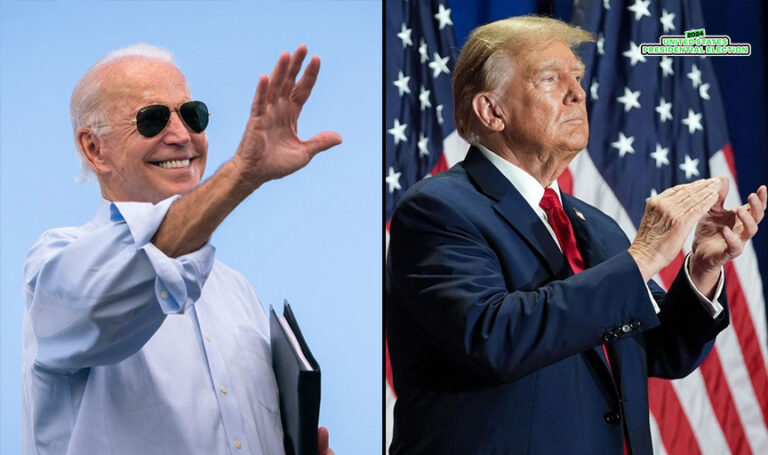US politics this week: Biden continues to use TikTok after signing ban and Trump rises among Black voters
Welcome back to the latest edition of our weekly recaps for the upcoming 2024 US presidential election. After another eventful week in Washington, let’s unpack President Joe Biden’s intentions to continue utilising TikTok for his campaign efforts, despite signing a bill banning the app. We’re also going to be delving into the president’s intensifying outreach to Hispanic voters. And, on the other side of the aisle, the ever-polarising former president Donald Trump is making waves with his attempts to court Black voters, despite a history that’s earned him labels such as “former white supremacist in chief.” So, let’s dive in.
Biden, the TikTok ban, and crucial voting blocs
In an incredibly ironic move, President Biden has stated his intentions to continue using TikTok to aid his way through his election campaign. Despite agreeing to implement a blanket ban on TikTok in the US, unless a sale from Chinese company ByteDance occurs, Biden is holding onto the app tighter than a teenager with their first smartphone.
The ban, nestled within a hefty foreign aid package, aims to give ByteDance, TikTok’s parent company, the boot from American soil within a year. That is unless they’re able to hop off the ban train by 19 January 2025, a day before the presidential inauguration.
With 170 million Americans actively engaging on TikTok, team Biden seems to be unfazed by this move, still very much embracing the platform’s popularity—particularly in an attempt to connect with young voters. Indeed, Biden’s strategists have been employing innovative campaign tactics to attract support.
@kamalahq lol
♬ original sound - Kamala HQ
@kamalahq benchwarmer don
♬ original sound - Kamala HQ
Meanwhile, Biden is also ramping up his outreach to Hispanic voters faster than you can say “Hola!” It seems as though the president’s recent Univision interview wasn’t just a ploy to out-Trump. It was also a full-scale acknowledgement that the Hispanic vote isn’t just a side dish; it’s the main course of this political fiesta.
The president’s campaign is pulling out all the stops with this voter outreach, from investing in ESPN Deportes ads to joining the Reach app revolution—an app that serves as a platform for volunteers to engage with voters directly, providing them with resources and guidance on how to effectively targeting their communities. This has all been undoubtedly an attempt to win over Latino voters. It’s like watching your dad try to figure out Snapchat;
In 2020, Biden secured 63 per cent of the Hispanic vote. And, while there are limited high-quality polls on Latino voters, some Democrats caution that they may be shifting away from the party, particularly in crucial battleground states. During a recent visit to Arizona, the President emphasised the importance of Hispanic support, stating, “I need your assistance urgently. You played a significant role in my victory over Donald Trump.”
Donald Trump compares deadly Charlottesville rally to pro-Palestine campus protests
On the other hand, Trump has been attempting to court Black voters, a move that might seem unexpected coming from a figure who was once labelled as the “former white supremacist in chief” by US Representative Cori Bush. However, Trump’s support among Black voters appears to be expanding at a noteworthy pace.
Despite being called “disgusting” by fellow Republicans and receiving side-eye from Nikki Haley, Trump’s charm offensive is working. The candidate’s Black voter support has risen from 8 per cent to 12 per cent, and he’s eyeing even bigger numbers come election time.
However, according to a recent survey conducted by GenForward, if the elections were held today, only 17 per cent of Black voters would cast their ballots for Trump, while 20 per cent expressed their preference for candidates other than Trump or Biden.
And, just when you thought things couldn’t get more absurd, Trump also went and compared a deadly white supremacist rally to the ongoing college protests over the Israel-Hamas war. Yes, that really happened.
Amid his ongoing criminal hush-money trial, Trump called the 2017 white supremacist rally in Charlottesville, Virginia, which led to the death of a woman, a “peanut” in comparison to the University anti-war protests calling for a ceasefire in Gaza. The politician stated: “We’re having protests all over. [Biden] was talking about Charlottesville. Charlottesville was a little peanut! And it was nothing compared—and the hate wasn’t the kind of hate that you have here.”
For context, in 2017, the “Unite the Right” rally in Charlottesville saw neo-Nazis and white supremacists chanting hateful slogans, resulting in brutal violence, including the death of Heather Heyer, an anti-racist protester.
Ammar Moussa, the Biden campaign’s rapid response director, said in a statement that “the American people are not going to be lectured to by the guy who called white supremacists very fine people after they chanted ‘Jews will not replace us’ and killed a woman.” Moussa added that Trump “was never in touch with the vast majority of the American people, but his years down in Mar-a-Lago have him even more unhinged heading into 2024.”
It’s increasingly evident that in the world of politics, the lines between reality and absurdity are being increasingly blurred. From TikTok campaign strategies to inflammatory comparisons, the stage is set for another whirlwind of election. But, amid the chaos, one thing remains clear: whether it’s a deadly rally or a social media storm, the consequences are real, and the stakes couldn’t be higher.






